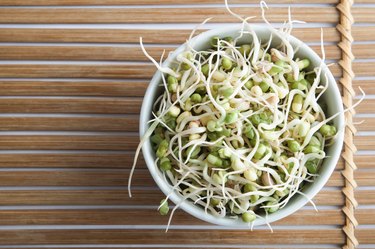
There are many types of beans whose sprouts are edible. Since there are many, bean sprouts nutrition facts may vary depending on the type and cooking method. Bean sprouts calories and carbs in bean sprouts are distinct based on different types of beans, such as mung beans and soybeans.
Bean sprouts appear through the germination of some plants. According to a January 2014 study published in Chemistry Central Journal, bean sprouts may be more beneficial than the actual bean from which the sprouts grow. Researchers also found bean sprouts to be high in antioxidants.
Video of the Day
Video of the Day
You may have seen bean sprouts on your salad or in your ramen. They are commonly consumed in Asian cuisine. Some controversy exists around whether you should consume bean sprouts raw or cooked. You may want to thoroughly cook your bean sprouts to avoid food poisoning or other contamination.
Tip
Mung bean sprouts are one of the most common types of bean sprouts. A serving size is 100 grams, which is approximately half a cup, and contains 30 calories and 5.9 grams of carbohydrates.
Bean Sprouts Nutrition Facts
Mung bean sprouts nutrition facts and those of soybean sprouts are similar in terms of vitamin C and fiber content. However, mung bean sprouts tend to be lower in macronutrients and micronutrients compared to soybean sprouts.
According to the USDA, a 100-gram serving of raw mung bean sprouts contains:
- 30 calories
- 0.2 grams of fat
- 5.9 grams of carbohydrates
- 1.8 grams of fiber
- 3 grams of protein
- 28 percent daily value (DV) of vitamin K
- 15 percent DV of vitamin C
- 5 percent DV of iron
- 5 percent DV of magnesium
Raw mung bean sprouts are also free of saturated fat and cholesterol, though they contain 4.1 grams of natural sugar per serving. Other nutrients found in raw mung bean sprouts include calcium, zinc and vitamin E, though it is not a significant source of these nutrients.
According to the USDA, a 100-gram serving of raw soybean sprouts contains:
- 122 calories
- 6.7 grams of fat
- 9.6 grams of carbohydrates
- 1.1 grams of fiber
- 13.1 grams of protein
- 17 percent DV of magnesium
- 17 percent DV of vitamin C
- 12 percent DV of iron
- 11 percent DV of zinc
- 10 percent DV of potassium
Unlike mung bean sprouts, soybean sprouts contain 5 percent DV of saturated fats. They also contain insignificant sources of sodium, selenium and calcium.
Bean Sprouts Calories
If you follow a low-calorie diet, especially for weight loss, you may want to know how the bean sprouts calories fit into your caloric targets.
In terms of raw bean sprouts, mung beans tend to yield the lowest bean sprouts calories at 30 per serving. However, you can still enjoy other bean sprouts, such as soybean sprouts containing 122 calories per serving, in moderation.
Cooking methods can significantly affect bean sprouts calories and other nutrition facts, such as the carbs in bean sprouts. For example, bean sprouts that are added to stir fries may be higher in calories and fat because they are cooked in oil or other sources of fat. Boiling or steaming bean sprouts will yield less calories than frying or sautéing them. Cooking your bean sprouts may cause them to lose some nutrients, however.
To consume fewer bean sprouts calories, consider using them to garnish your food. Rather than make bean sprouts the center of the dish, serve them on the side or as a topping to soups and salads.
Carbs in Bean Sprouts
The carbs in bean sprouts may be something that concerns you if you follow a low-carb diet, such as the keto diet. However, the carbs in bean sprouts are much lower than the whole beans themselves as well as other raw vegetables or cooked legumes.
Mung bean sprouts contain just 5.9 grams of carbs (2 percent DV) per serving while soybean sprouts contain 9.6 grams of carbs (3 percent DV).
Many people who follow a strict low-carb diet have certain macronutrient targets. For example, some followers of the strictest Atkins diet plan limit their daily net carbs to 20 grams or fewer. On the keto diet, followers limit their carbs to 50 grams per day. If you follow either of these diets and want to consume bean sprouts, remember that mung bean sprouts are lower in carbs. Reducing the serving size of soybean sprouts may allow you to eat them on a low-carb diet.
Fortunately, if you do not follow a specific low-carb diet, both of these bean sprouts will give you lots of nutrition and a healthy source of carbohydrate.
Should You Eat Bean Sprouts?
Some people are hesitant to consume bean sprouts because of the potential for food poisoning. According to the Academy of Nutrition and Dietetics, bacteria may grow on bean sprouts, causing them to become contaminated. To avoid this, they recommend selecting your bean sprouts very carefully or cooking them to kill off the bad bacteria.
Bean sprouts can be a great dietary source of many nutrients, including fiber, protein, vitamin C and iron. For people who follow diets that regulate calories and carbohydrates, mung bean sprouts may be preferred as they are lower in both calories and carbs.
- MyFoodData: “Nutrition Facts for Mung Bean Sprouts”
- MyFoodData: “Nutrition Facts for Soybean Sprouts”
- Academy of Nutrition and Dietetics: “Are Sprouts Safe to Eat?”
- Chemistry Central Journal: “A review of phytochemistry, metabolite changes, and medicinal uses of the common food mung bean and its sprouts (Vigna radiata).”
- Sprout People: Leafy Sprouts and Ways to Eat Them